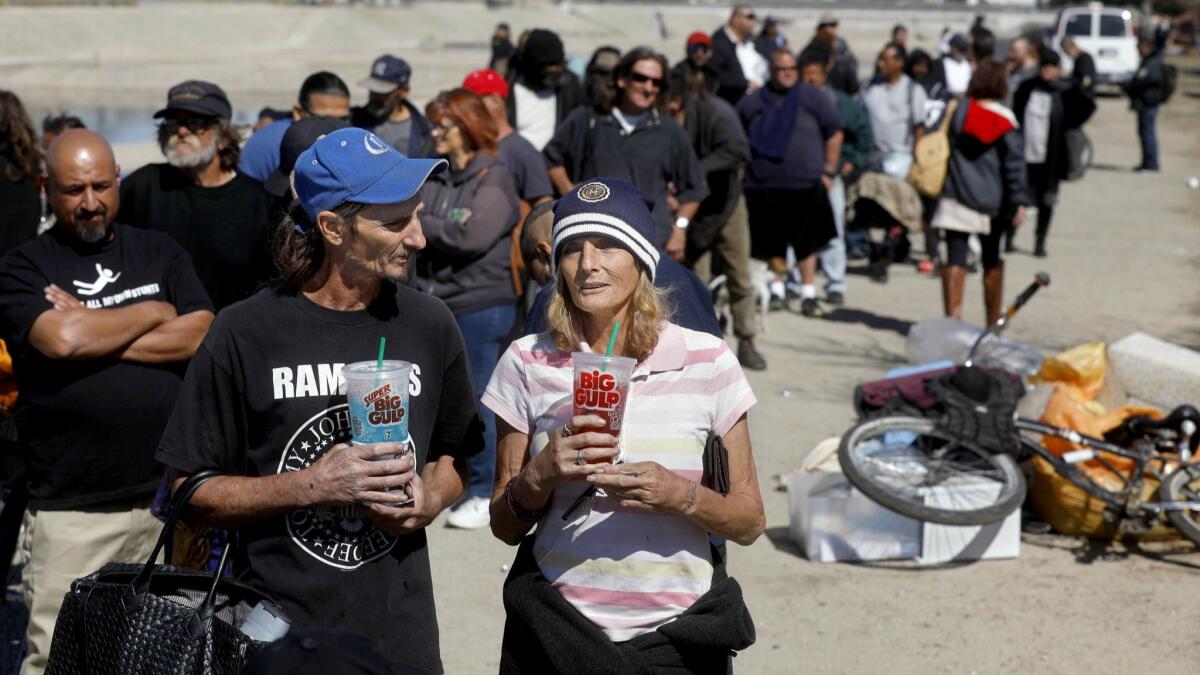CalOptima plans to launch mobile medical program for the homeless in April, but Do calls pace too slow

- Share via
A county health organization that serves the medical needs of the poor and homeless will roll out a new program next month that sends mobile clinical teams into the streets to directly treat the ailing and destitute.
CalOptima’s announcement follows criticism from Orange County Supervisor Andrew Do, who accused the agency of moving “too slowly.”
Do said Monday that the program, approved on Feb. 22, should already be up and running.
“I am very frustrated,” said Do. “It’s to the point where they are either tone deaf or they don’t know what the heck they are doing.”
The CalOptima board of directors, on which Do sits, approved the program at a special meeting days after U.S. District Judge David O. Carter met with board members. Carter had issued a court filing on Feb. 19 describing the number of homeless deaths in Orange County as a “crisis.”
There were more than 250 homeless deaths in 2018, a significant increase from the 181 reported in 2015.
Carter is overseeing a lawsuit launched by legal advocates that seeks to rectify the county’s spiraling homelessness. Although CalOptima has not been named in the lawsuit, the organization has been asked to send representation to the next hearing on April 2.
“The program is a top priority, and we want to move as quickly as possible,” said Michael Schrader, chief executive of CalOptima. “We also want to develop a program that’s going to be long-lasting, that’s really going to help our homeless members and tie in to the existing system of care.”
The program will comprise clinical field teams — which could include a physician, medical assistant and social worker — of three or four.
“We want the teams to be responsive and nimble. We don’t want a big mobile clinic,” Schrader said. “We want three or four people in a private vehicle that can respond on short notice and go to parks and riverbeds, wherever the homeless person needs, to deliver urgent care services.”
Services could include treating coughs, infections and wounds, as well as providing health screenings.
Schrader said patients could be treated on a park bench.
Some teams will be on call. Others will have regular hours at homeless shelters, including the Bridges at Kraemer Place in Anaheim.
An eight-member Homeless Response Team will act as a dispatch center, fielding calls and coordinating field teams.
Field teams will stem from partnerships with five federally-qualified health centers, organizations that provide care to anyone regardless of health insurance status.
When this article was originally published on Monday, CalOptima had not finalized any of the contracts with the health centers. By Friday, three of the five organizations—Korean Community Services, Central City Community Health Center and Serve the People—had signed contracts with CalOptima.
CalOptima is still working on a number of details, including scheduling and the number of teams it can field.
Shrader didn’t provide a specific day in April that the program will begin.
“It seems like staff is more interested in making headlines before actually having results,” Do said. “You don’t go out and make proclamations that we are going to do this until you have contracts.”
12:15 p.m. Friday: Updated with CalOptima finalizing three of the five contracts with federally-qualified health centers.
All the latest on Orange County from Orange County.
Get our free TimesOC newsletter.
You may occasionally receive promotional content from the Daily Pilot.







